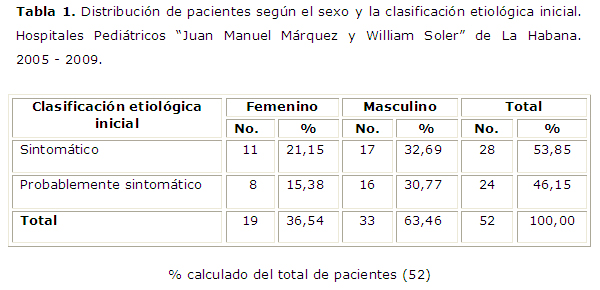Estudio clínico-genético de pacientes cubanos con síndrome de West
Palabras clave:
Espasmos infantiles/clasificación/etiología/genética.Resumen
El síndrome de West constituye una encefalopatía epiléptica asociada a una amplia diversidad de factores causales, cuyas bases genéticas hasta el momento no se han estudiado en Cuba. Con el objetivo de describir las principales características clínicas y genéticas del trastorno, se realizó un estudio descriptivo, transversal en los pacientes con el síndrome de West, atendido en dos hospitales pediátricos de La Habana desde enero de 2005 a diciembre del año 2009. Predominaron los pacientes masculinos. Inicialmente los casos sintomáticos representaron solo el 53.85% del total. Se identificó la historia familiar positiva de epilepsia en el 51.92% y hubo una recurrencia del diagnóstico de síndrome West en tres familias; lo que orienta hacia la participación del componente genético en el desarrollo de este síndrome epiléptico. El 82.69% presentó hallazgos positivos al examen físico, de ellos, el 11.63% mostró anomalías cromosómicas. Las pruebas metabólicas aportaron diagnóstico en el 17.39% de los casos con antecedentes familiares positivos y/o defectos congénitos. Finalmente se modificó la frecuencia de clasificación del síndrome epiléptico concluyendo el estudio con un 78.85% de casos sintomáticos lo que apoya la utilidad del enfoque genético en la evaluación de los pacientes con síndrome de West.
Descargas
Citas
1. Pal DK, Pong AW, Chung WK. Genetic evaluation and counseling for epilepsy. Nat Rev Neurol. [Internet]. 2010 [Citado 20 de mayo de 2011]; 6(8): [Aprox. 8p.]. Disponible en: http://www.nature.com/nrneurol/journal/v6/n8/full/nrneurol.2010.92.html
2. Fois A. Infantile spasms: review of the literature and personal experience. Ital J Pediatr. [Internet]. 2010 [Citado 20 de mayo de 2011]; 36: [Aprox. 1p.]. Disponible en: http://www.ncbi.nlm.nih.gov/pmc/articles/PMC2829573/?tool=pubmed
3. Shields WD. Infantile Spasms: Little Seizures, BIG Consequences. Epilepsy Curr. [Internet]. 2006 [Citado 20 de mayo de 2011]; 6(3): [Aprox. 6p.]. Disponible en: http://www.ncbi.nlm.nih.gov/pmc/articles/PMC1464162/?tool=pubmed
4. Pellock MJ, Hrachovy R, Shinnar S, Baram TZ, Bettis D, Dlugos DJ, et al. Infantile spasms: A U.S. consensus report. Epilepsia. [Internet]. 2010 [Citado 20 de mayo de 2011]; 51(10): [Aprox. 14p.]. Disponible en: http://onlinelibrary.wiley.com/doi/10.1111/j.1528-1167.2010.02657.x/full
5. Auvin S, Lamblin MD , Pandit F , Vallée L , Bouvet-Mourcia A . Infantile epileptic encephalopathy with late-onset spasms: report of 19 patients. Epilepsia. [Internet]. 2010 [Citado 20 de mayo de 2011]; 51(7): [Aprox. 6p.]. Disponible en: http://onlinelibrary.wiley.com/doi/10.1111/j.1528-1167.2010.02534.x/full
6. Hino-Fukuyo N, Haginoya K, Iinuma K. Epidemiological and clinical studies of West syndrome in Miyagi Prefecture, Japan. No To Hattatsu. [Internet]. 2007 [Citado 20 de mayo de 2011]; 39(4): [Aprox. 4p.]. Disponible en: http://www.ncbi.nlm.nih.gov/pubmed/17633081
7. Nguyen DK, Disteche CM. High expression of the mammalian X chromosome in brain. Brain Res. [Internet]. 2006 [Citado 20 de mayo de 2011]; 1126(1): [Aprox. 3p.]. Disponible en: http://www.sciencedirect.com/science/article/pii/S0006899306024565
8. Jones JR, Skinner C, Friez MJ, Schwartz Ch, Stevenson RE. Hypothesis: Dysregulation of methylation of brain-expressed genes on the X chromosome and autism spectrum disorders. Am J Med Genet. [Internet]. 2008 [Citado 20 de mayo de 2011]; 146 (17): [Aprox. 7p.]. Disponible en: http://www.utdallas.edu/~mxa049000/lessons/research/literature/Autism/new/Genemethylandautismrev%2009.pdf
9. Kitamura K, Itou Y, Yanazawa M, Ohsawa M, Suzuki-Migishima R, Umeki Y, et al. Three human ARX mutations cause the lissencephaly-like and mental retardation with epilepsy-like pleiotropic phenotypes in mice. Hum Mol Genet. [Internet]. 2009 [Citado 20 de mayo de 2011]; 18(19): [Aprox. 16p.]. Disponible en: http://www.mendeley.com/research/three-human-arx-mutations-cause-lissencephalylike-mental-retardation-epilepsylike-pleiotropic-phenotypes-mice/
10. Friocourt G, Parnavelas JG. Mutations in ARX Result in Several Defects Involving GABAergic Neurons. Front Cell Neurosci. [Internet]. 2010 [Citado 20 de mayo de 2011]; 4. Disponible en: http://www.ncbi.nlm.nih.gov/pmc/articles/PMC2841486/
11. Dulac O, Feingold J, Plouin P, Chiron C, Pajot N, Ponsot G. Genetic predisposition to West syndrome. Epilepsia. [Internet]. 1993 [Citado 20 de mayo de 2011]; 34(4): [Aprox. 5p.]. Disponible en: http://www.ilae.org/visitors/centre/ctf/west_syndrome.cfm
12. Sugai K, Fukuyama Y, Yasuda K, Fujimoto S, Ohtsu M, Ohta H, et al. Clinical and pedigree study on familial cases of West syndrome in Japan. Brain & development. [Internet]. 2001 [Citado 20 de mayo de 2011];23(7):[Aprox. 6p.]. Disponible en: http://www.sciencedirect.com/science/article/pii/S0387760401002625
13. Arce Portillo E, Rufo-Campos M, Muñoz-Cabello B, Blanco-Martínez B, Madruga-Garrido M, Ruiz-Del Portal L, et al. Síndrome de West: etiología, opciones terapéuticas, evolución clínica y factores pronósticos. Rev Neurol. [Internet]. 2011 [Citado 20 de mayo de 2011]; 52: [Aprox.8p.]. Disponible en: http://www.neurologia.com/pdf/Web/5202/bf020081.pdf
14. Chandra PS, Salamon N, Nguyen ST. Infantile spasm-associated microencephaly in tuberous sclerosis complex and cortical dysplasia. Neurology. [Internet]. 2007 [Citado 20 de mayo de 2011]; 68(6): [Aprox. 7p.]. Disponible en: http://www.neurology.org/content/68/6/438.long
15. Campistol J, García-Cazorla A. Síndrome de West. Análisis, factores etiológicos y opciones terapéuticas. Rev Neurol. [Internet]. 2003 [Citado 20 de mayo de 2011]; 37(4): [Aprox. 7p.]. Disponible en: http://www.neurologia.com/pdf/Web/3704/p040345.pdf
16. Vigevano F, Bartuli A. Infantile epileptic syndromes and metabolic etiologies. J Child Neurol. [Internet]. 2002 [Citado 20 de mayo de 2011]; 17 (Suppl 3): [Aprox. 4p.]. Disponible en: http://web.ebscohost.com/ehost/pdfviewer/pdfviewer?sid=352915bf-e57f-449d-8d58-170ef619d185%40sessionmgr11&vid=2&hid=125

Publicado
Cómo citar
Número
Sección
Licencia
Aquellos autores/as que tengan publicaciones con esta revista, aceptan los términos siguientes:- Los autores/as conservarán sus derechos de autor y garantizarán a la revista el derecho de primera publicación de su obra, el cuál estará simultáneamente sujeto a la Licencia de reconocimiento de Creative Commons que permite a terceros compartir la obra siempre que se indique su autor y su primera publicación esta revista.
- Los autores/as podrán adoptar otros acuerdos de licencia no exclusiva de distribución de la versión de la obra publicada (p. ej.: depositarla en un archivo telemático institucional o publicarla en un volumen monográfico) siempre que se indique la publicación inicial en esta revista.
- Se permite y recomienda a los autores/as difundir su obra a través de Internet (p. ej.: en archivos telemáticos institucionales o en su página web) antes y durante el proceso de envío, lo cual puede producir intercambios interesantes y aumentar las citas de la obra publicada. (Véase El efecto del acceso abierto).


